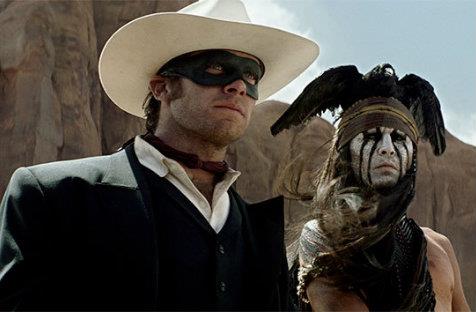The western, too infrequently seen on cinema screens in recent years, may be in the midst of a minor resurgence. It has taken Hollywood some time to re-embrace the genre after its embers were fanned back into life in 2005 with the success of Ang Lee’s Brokeback Mountain and Tommy Lee Jones’ The Three Burials of Melquiades Estrada, but recent releases suggest this most quintessential of American film styles is back with a vengeance. First, Quentin Tarantino turned his love of spaghetti westerns into the modernised homage that was Django Unchained, with great acclaim and an Oscar for his troubles. Now, director Gore Verbinski and producer Jerry Bruckheimer not only conjure up a remake of one of the genre’s most enduring characters, but set their interpretation of The Lone Ranger on a rollicking ride into matinee movie territory.
It’s classical westerns, and their tales of railroads, ranches and revenge – as well as empires, outlaws, Native Americans and officers of the law – that the film tries to evoke; The Lone Ranger ambitiously includes all of the above genre elements. Yet, the helmer and his powerhouse backer also call upon their own brand of formula, the four-time collaborators enlisting scribes Ted Elliott and Terry Rossio for a Pirates of the Caribbean reunion, complete with their familiar style and star.
So it is that Johnny Depp (Dark Shadows) inhabits the iconic role of Tonto despite his incongruous heritage, the eccentric Comanche offsider to Armie Hammer’s (Mirror Mirror) chivalrous titular protagonist. At a San Francisco fair in 1933, Tonto relates the blossoming of their odd couple pairing decades prior to an interested child (Mason Cook, The Incredible Burt Wonderstone) – a story predicated upon the antics of common enemy and wanted criminal Butch Cavendish (William Fichtner, Date Night), and prolonged by greed, genocide, family sacrifice and forbidden romance (in the form of Anna Karenina’s Ruth Wilson).
Using a script ultimately rewritten by Justin Haythe (Snitch), The Lone Ranger is sprawling in its ambit: part old-fashioned flair, part western hero origin story with an eye to a franchise, part reflection of the genre’s darker territory. And while each element works to some predictable yet busy degree – from the banter between Depp and Hammer that aptly elicits the requisite buddy vibe, to ample use of intermittently amusing throwaway gags, to the cultivation of menace in the plethora of narrative twists and turns – the combination never quite feels cohesive.
Instead, in fitting with the overt action-adventure interpretation of the 80-year-old property, it is the spectacle that triumphs: in impressively choreographed train heists, handsomely panoramic vistas, and throwbacks to western greats. There may be much too much of the former, and not enough of either of the latter, but Verbinski endeavours to add part of the genre magic that made his animated Rango so special. Amenable performances also evoke cinema of years gone by, including an amiable supporting turn from Helena Bonham Carter (Great Expectations). While there’s fun to be had, it proves too fleeting; the largely light-hearted atmosphere of the undemanding effort is unable to overcome the uneven tenor of the material.
Rating: 2 ½ stars out of 5
The Lone Ranger
Director: Gore Verbinski
USA, 2013, 149 mins
Release date: 4 July
Distributor: Disney
Rated: M
Actors:
Director:
Format:
Country:
Release:





